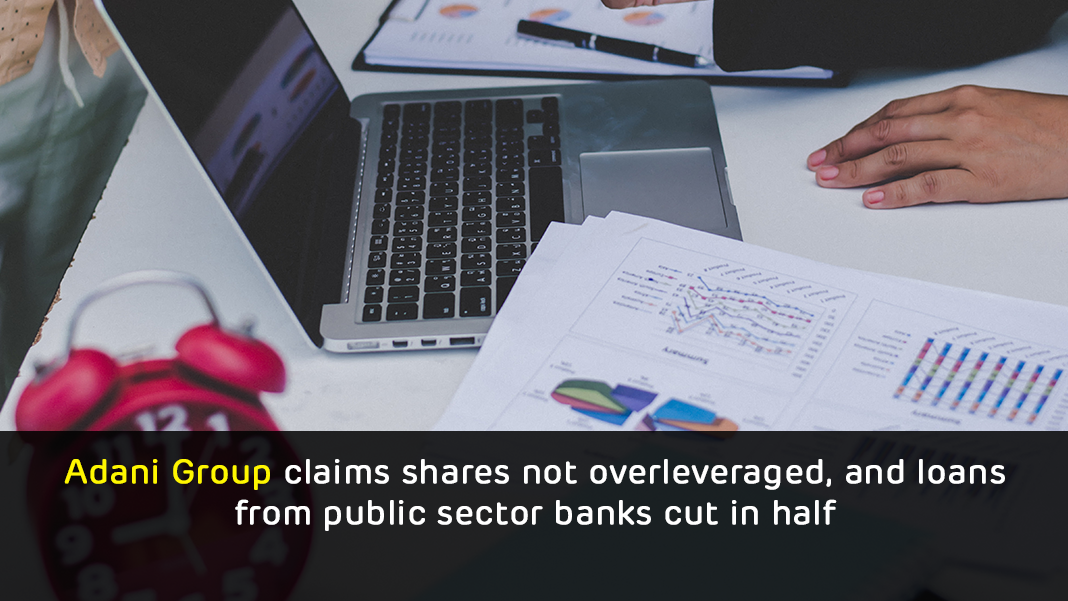
Adani Group claims shares not overleveraged, and loans from public sector banks cut in half
In the Adani shares overleveraged scandal, Gautam Adani’s group claimed a better net debt to operational profit ratio and a more than halving of loans from public sector banks. It claimed in a 15-page letter in response to CreditSights’ analysis that the group is overleveraged and that firms have continuously de-levered, with the net debt to E.B.I.T.D.A. ratio falling to 3.2 times from 7.6 times in the previous decade.
The companies follow a basic yet robust and repeatable business strategy centered on development and origination, operations and management, and capital management. Over the last decade, Adani portfolio firms have successfully and frequently implemented an industry-leading expansion strategy. While doing so, the firms have steadily de-levered, with the portfolio net debt to E.B.I.T.D.A. ratio falling from 7.6x to 3.2x. E.B.I.T.D.A. (Earnings Before Interest, Taxes, Depreciation, and Amortization) has risen at a 22% CAGR over the previous nine years, while debt has grown at an 11% CAGR.
The net debt to E.B.I.T.D.A. ratio has been reduced from 7.6x to 3.2x
Over the last decade, Adani portfolio firms have successfully and frequently implemented an industry-leading expansion strategy. While doing so, the firms have constantly de-levered, with the portfolio net debt to E.B.I.T.D.A. ratio falling from 7.6x to 3.2x and E.B.I.T.D.A. growing at a 22 percent CAGR over the previous ten years, according to the group’s reaction to the Adani shares overleveraged scandal. Adani Group stated that its firms’ leverage ratios “remain healthy and in line with industry benchmarks.”
Through their capital management approach, they have aggressively sought to improve their debt metrics over the previous 11 years. Over the last three years, the group has raised USD 16 billion through “comprehensive equity” as part of a systemic capital management plan for a half-dozen group businesses. They were funded by a mix of primary, secondary, and committed equity from worldwide investors such as TotalEnergies, Abu Dhabi-based International Holding Company P.J.S.C., Q.I.A., and Warburg Pincus.
This has also resulted in the deleveraging of promoter-level debt, allowing the promoter ownership pledge in listed businesses to be reduced. Adani Enterprises has an E.B.I.T.D.A. to gross interest ratio of 1.98.
Adani Group’s strategy for achieving zero refinancing or systemic risk by 2025
For 2022-23, the present free cash flow and cash in the bank are roughly Rs. 77,889 crore. Current gross debt is around Rs. 2.27 lakh crore, with an asset base of Rs. 4.22 lakh crore. The net debt to EBITDA ratio has been reduced from 3.8x in 2021-22 to 3.3x in 2022-23. Adani Group’s objective is to build enough cash from reserves and income earned from routine operations in the infrastructure industry to meet any future loans.
The goal is to reach this financial status by 2025. The fundamental rationale for using this method is to prevent having to refinance any debt and to avoid any market or economic risk, as well as the influence of global events. For 2022-2023, the present free cash flow and cash in the bank are roughly Rs. 77,889 crore. The net debt to E.B.I.T.D.A. ratio has been reduced from 3.8x in 2021-22 to 3.3x in 2022-23.
Press Trust of India (PTI) says the Adani Group module is robust and reputable
The companies follow a basic yet robust and repeatable business strategy: development and origination, operations and management, and capital management. According to the PTI on the Adani shares overleveraged dispute, Adani portfolio firms have effectively and regularly implemented an industry-beating expansion strategy over the last decade. While doing so, the firms have steadily de-levered, with the portfolio net debt to E.B.I.T.D.A. ratio falling from 7.6x to 3.2x.
E.B.I.T.D.A. has risen at a 22% CAGR over the previous nine years, while debt has grown at an 11% CAGR. Using data that differed from those reported, Adani Group stated that its firms’ leverage ratios “continue to be healthy and in line with industry benchmarks.” Over the last three years, the group has raised USD 16 billion through “comprehensive equity” as part of a systemic capital management plan for a half-dozen group businesses.
They were funded by a mix of primary, secondary, and committed equity from worldwide investors such as TotalEnergies Abu Dhabi-based International Holding Company PJSC, QIA, and Warburg Pincus.
Systematic Capital Management Plan over Adani shares overleveraged controversy
The Adani group has had a systematic capital management plan since 2019, long before the Adani shares overleveraged controversy (August 2022). TotalEnergies, IHC, QIA, and Warburg Pincus have all contributed $16 billion in equity to the scheme. The proposal used a combination of primary, secondary, and committed equity to raise equity. Adani plans to raise $50 billion in equity over the next two decades. The Adani group has diluted its shareholding by $5.79 billion in the previous four years.

